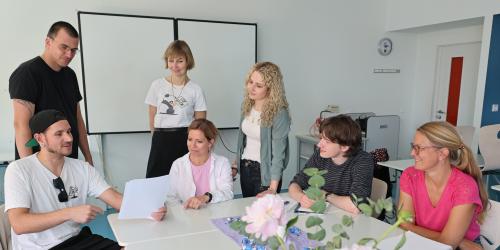
An investment in every single child
The nine-year-old is sitting on the floor under his desk. He drums pencils against the tabletop from underneath. Some of his classmates laugh, others cover their ears. Time and again, the fourth-grader causes disruption in the classroom with actions like this. His teacher has not yet found a way to calm the boy down. Even a discussion with the parents has not brought a solution.
In situations like this, schools can use the instrument of cooperative practical advice (KoPrax for short). Teachers register the case they want to talk about anonymously - only their age and gender are given. The KoPrax group, which meets once a month at the school, is made up of a teacher from the school, a school social worker, a member of staff from the General Social Services (ASD) and a member of staff from open child and youth work. School psychologists are often also involved, as are after-school care staff at elementary school.
"The fact that schools and youth welfare services work so closely together is something special," emphasizes education manager Stefanie Teichmann.
Special concept for Jena
The concept was developed specifically for Jena by Friedrich Schiller University and Ernst Abbe University. It has been implemented since summer 2010 and is now used at twelve schools in the city. In addition to elementary school, community schools and grammar schools also use KoPrax. If the players change, for example if there is a change of head teacher, the cooperation agreements between the education authority, youth welfare office, school, school social work and independent youth welfare organizations are renewed. The Ernst-Abbe-Gymnasium, the Saaletal elementary school and the Kulturanum community school have now decided to do this.
"With these agreements, we as school authorities are reaffirming our responsibility to support schools not only organizationally, but also pedagogically. The city provides targeted resources from youth welfare services for this purpose - for a trusting cooperation in the interests of the children," says Johannes Schleußner, Head of Education. "My special thanks go to the schools and the independent providers who are highly committed to this important format."
The monthly meetings at the schools always focus on the question of how the individual child can be supported. After the teacher has formulated their problem, all participants can ask questions to understand the case. Everyone in the group then puts forward hypotheses from their own perspective and role.
"An outside perspective is often enormously helpful," emphasizes Teichmann.
Different perspectives
While teachers primarily focus on school processes, those involved in open child and youth work are very familiar with the current leisure activities of many young people. The team from the General Social Service (ASD) is trained in how to provide comprehensive support to families, while school social workers often act as mediators between the different worlds.
"The multi-professional composition of the KoPrax meetings also means that the players get to know the working methods of the other professional groups better," says coordinator Teichmann.
Joint root cause analysis
The group works together to investigate the causes. Is a special educational assessment required to determine whether the fourth grader needs special support? Is there possibly a reading or spelling difficulty or an attention deficit? How can the child's energy be channeled? Does it help if the boy attends a club after school?
"Amazing ideas often emerge in these discussions," says Teichmann. Ideally, the teacher will end up with several possible solutions, from which they can choose one.
In the case of the restless nine-year-old, it turned out that he needed to be able to act out his urge to move more. The boy was included in an after-school project, which enabled him to regularly attend an open sports program outside of school in the afternoons. Thanks to the physical challenges as a balance to school, the child is able to follow lessons better and better.
"The journey is sometimes long and strenuous - but it's worth it," says coordinator Teichmann. "We invest in each individual child with this important tool," emphasizes Schleußner, Head of Education. Incidentally, the case consultation does not necessarily take place where it is particularly frequently needed, but is rather a quality feature. Schleußner: "It distinguishes a school when it opts for this multi-professional form of consultation."
